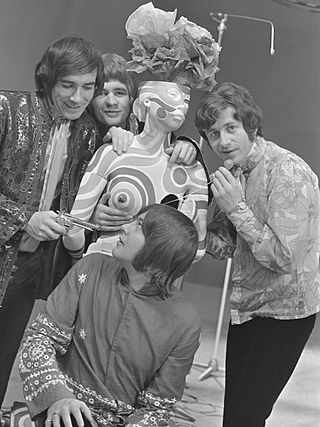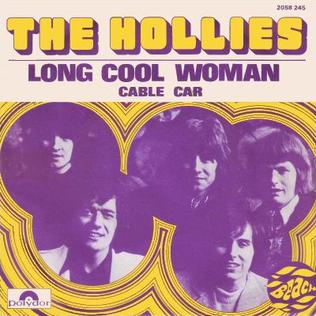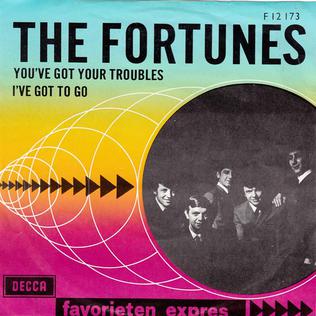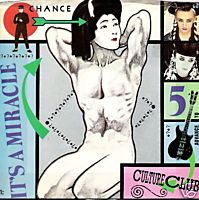
Chink is an English-language ethnic slur usually referring to a person of Chinese descent, but also used to insult people with East Asian features. The use of the term describing eyes with epicanthic folds is considered highly offensive and is regarded as racist by many.

The Flower Pot Men were an English pop group created in 1967 as a result of the single "Let's Go to San Francisco", recorded by session musicians, which became a major UK Top 20 and Continental Europe hit in the autumn of 1967. The group's sound was characterised by rich, three-part vocal harmonies.

Madeline Bell is an American soul singer, who became famous as a performer in the UK during the 1960s and 1970s with pop group Blue Mink, having arrived from the United States in the gospel show Black Nativity in 1962, with the vocal group Bradford Singers.
Blue Mink were a British six-piece pop group that existed from 1969 to 1977. Over that period they had six top 20 hit singles on the UK Singles Chart, and released five studio based albums. According to AllMusic: "they have been immortalised on a string of compilation albums, each recounting the string of effervescent hits that established them among Britain's best-loved pop groups of the early 1970s."

"Long Cool Woman in a Black Dress" (also titled "Long Cool Woman" or "Long Cool Woman (in a Black Dress)") is a song written by Allan Clarke, Roger Cook and Roger Greenaway, and performed by the British rock group the Hollies. In an interview with Johnnie Walker on BBC Radio 2 on Sounds of the 70s in April 2023, Clarke said it had been written by himself and Cook. Cook had a long-standing agreement with Greenaway that any songs written by one of them should be credited to both.

Roger Frederick Cook is an English singer, songwriter and record producer, who has written many hit records for other recording artists. He has also had a successful recording career in his own right.

Roger John Reginald Greenaway is an English singer, songwriter and record producer, best known for his collaborations with Roger Cook and Tony Burrows. His compositions have included "You've Got Your Troubles" and the transatlantic million-selling songs "I'd Like to Teach the World to Sing " and "Long Cool Woman in a Black Dress". They were the first UK songwriting partnership to be granted an Ivor Novello Award as 'Songwriters of the Year' in two successive years.

White Plains were a British pop music group that existed from 1969 to 1976. They had an ever-changing line-up of musicians and five UK hit singles, all on the Deram Records label, in the early 1970s.

Anne Crummer is a New Zealand pop singer and songwriter of Cook Islands descent who has seen success in both a solo career and as part of various musical groups.
John Nicholas Shakespeare, known as John Carter, is an English singer, songwriter, and record producer.

"You've Got Your Troubles" was the inaugural composition by the prolific songwriting team of Roger Cook and Roger Greenaway in 1964. "You've Got Your Troubles" became a number 2 UK hit for the Fortunes in the United Kingdom in August 1965, affording the group international success including a Top Ten ranking in the US. The track was included on the Fortunes' self-titled 1965 debut album release, the group's only album release of the 1960s.
The melting pot is an analogy for the way in which heterogeneous societies become more homogeneous.

"It's a Miracle" is the fifth and final single from new wave band Culture Club's 1983 Colour by Numbers album. The song became the group's sixth hit on the UK Singles Chart, peaking at number 4. It reached number 13 on the US Billboard Hot 100, and number 5 in Canada.

"Gimme Dat Ding" is a 1970 popular UK song, of the novelty type, sung by "one-hit wonder" The Pipkins, and written and composed by Albert Hammond and Mike Hazlewood. Released as a single, it is the title selection of an album which The Pipkins recorded and released on the EMI Columbia Records label. It also appeared on a compilation album of the same name, which The Pipkins shared with another up-and-coming UK group, The Sweet. It has also been included on many other compilation albums. "Gimme Dat Ding" was arranged by Big Jim Sullivan.
"Doctor's Orders" is a song written by Roger Cook, Roger Greenaway and Geoff Stephens which, in 1974, was a hit in the UK for Sunny of Sue and Sunny; in the US the song was a hit for Carol Douglas.
When the Cat's Away is a New Zealand female vocal group and covers band formed in 1985. They are best known for their cover of the Blue Mink assimilationist song "Melting Pot", which became a New Zealand number one hit for them in 1988. In 2021, the band members were inducted into the New Zealand Music Hall of Fame.

Together is a 1974 album by British pop group The New Seekers. It features the No. 1 single "You Won't Find Another Fool Like Me" and the top five follow-up "I Get a Little Sentimental Over You". It was the last album the group released before a much-publicised split.

Only When I Laugh is the fourth album by the British pop group Blue Mink, released in 1973. It was released under the title "Blue Mink" in the U.S., Canada and New Zealand. Two singles from the album charted in the UK, “By the Devil ” at #26 and “Randy” at #9. Most of the tracks were written by Flowers, Cook and Roger Greenaway.

"Good Morning Freedom" is a song by British pop group Blue Mink, released as a single in March 1970. It was released as a non-album single, but was included on the US album Real Mink. It peaked at number 10 on the UK Singles Chart.
"The Banner Man" is a 1971 song by the British pop band Blue Mink. The song managed to reach the top ten on the UK charts peaking at #3 in May 1971. It was released as a single with the B-side "Mind Your Business". The single was written by Blue Mink founders Roger Cook and Roger Greenaway.














